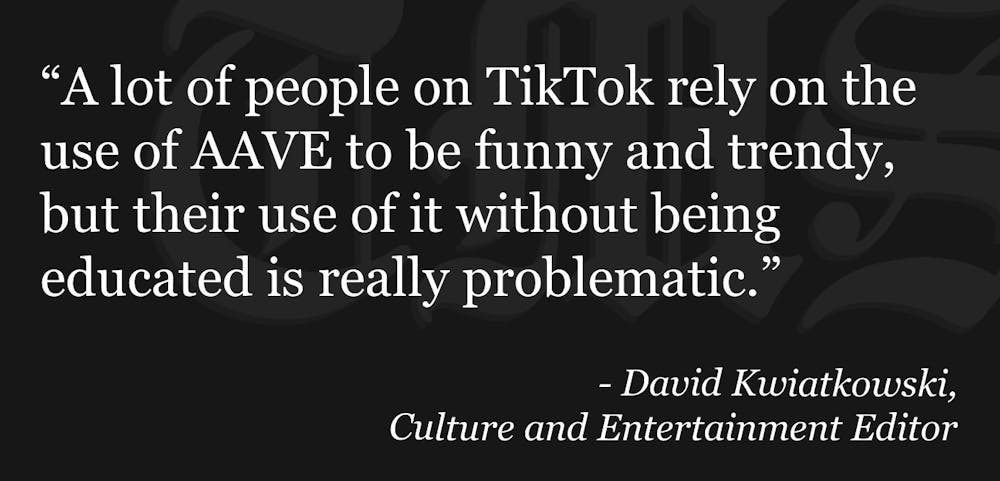Odds are, if you have the cultural sensation that is TikTok, you might be familiar with the popular sayings that have been used on there and probably have been incorporating them into your everyday life.
Sayings like “It’s the *insert aspect here* for me” or “Periodt” or “Chile, anyway” are examples of popular TikTok phrases.
It might be a shock to some of you, but those have been around even longer than when the phrase “Tik Tok” was synonymous with the Kesha song.
They are examples of AAVE, otherwise known as African American Vernacular English, a dialect of American English characterized by pronunciations, syntactic structures and vocabulary associated with and used by some North American Black people and exhibiting a wide variety and range of forms varying in the extent to which they differ from Standard American English.
It is often scrutinized and classified as not actual English. However with the rise of the app, non-Black people are beginning to see it as “Internet stan culture” and adopting it into their everyday vocabulary.
Brittany Broski, famous for the “kombucha tasting” TikTok, came under fire recently for claiming phrases like “period,” “sis,” “snatch” and “chile” as “stan Twitter culture” and not realizing that phrases like this have a root in another culture that has been around since chattel slavery.
She soon apologized after social media called her out for not being educated about the existence of AAVE, and she acknowledged her lack of knowledge in her apology tweet.
It is something I, too, have had to reckon with. As it is often looked down upon by grammarians as a lesser form of English, it is not something that we are taught exists.
I use phrases like “deadass” and “period” every day without even knowing where they stemmed from. Purposefully improper verb usage like “I been had a job” or “Professors be like” also stem from AAVE.
A lot of the slang I use does come from the predominantly Black drag culture that originated in Harlem, New York, and it is something I try to be conscious of when I am trying to be funny and want to make a joke.
A lot of people on TikTok rely on the use of AAVE to be funny and trendy, but their use of it without being educated is really problematic.
If you are making a joke and you have a very obvious “blaccent,” then you are probably using AAVE.
Enjoy what you're reading?
Signup for our newsletter
Since I have become aware of AAVE, I have not waited to swipe up on my friends’ Snapchat stories and let them know why their use of phrases like “It’s the (blank) for me” is problematic if they do not know where it comes from.
AAVE is being used as a crutch for TikTokers to try to remain relevant and trendy, and once you become conscious of its prevalence, it is hard to argue that users are really being anything but copycats.
When I scroll down my “For You” page, I can’t help but think that users are lacking originality so they just copy the language used in popular TikToks without knowing the history of oppression behind it.
Non-Black people do not deserve to profit off a dialect that Black people created and are looked down upon for using.
Words like “salty,” “bae,” even the word “woke” stem from AAVE and have permeated the American lexicon since they gained traction on the Internet which makes corporations think it is OK to use them for marketing purposes.
Education is essential for the youth of today to know that the same verbiage they use online was the same one that Black people were deemed unintelligent for using.
Yes, blending of languages and dialects is inevitable within any society. However, AAVE is being appropriated. The difference between appropriation and cultural transfusion is credit. People need to start realizing that just because you saw something on TikTok does not mean that you can recreate it and make it your own.
AAVE is not everyone’s public domain. Pay this information forward and stop to think about the next time you go to be trendy or funny, are you actually just being ignorant?




